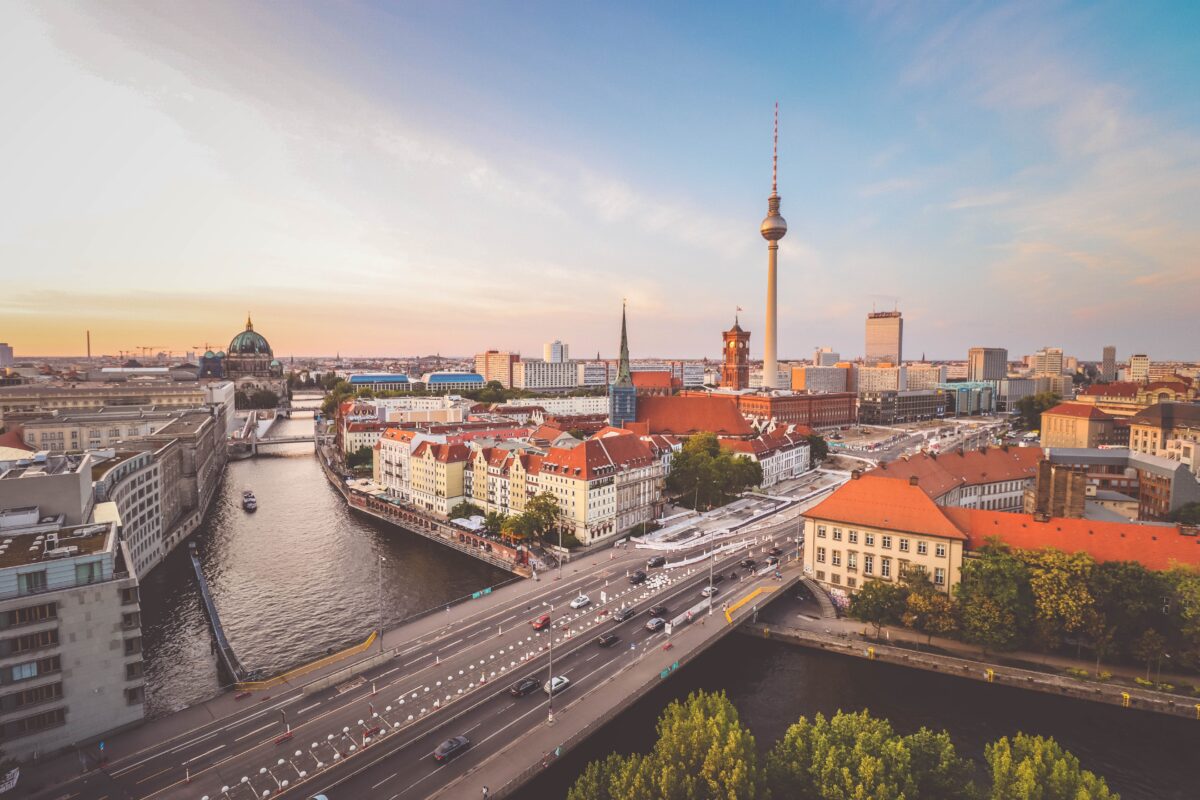hosted by Humboldt UniversitäT Zu Berlin at the ErwinSchrödinger Zentrum in Berlin, Germany, from Wednesday 30th August – Friday 1st September, 2023.
All talks that we have consent to share can be found here.
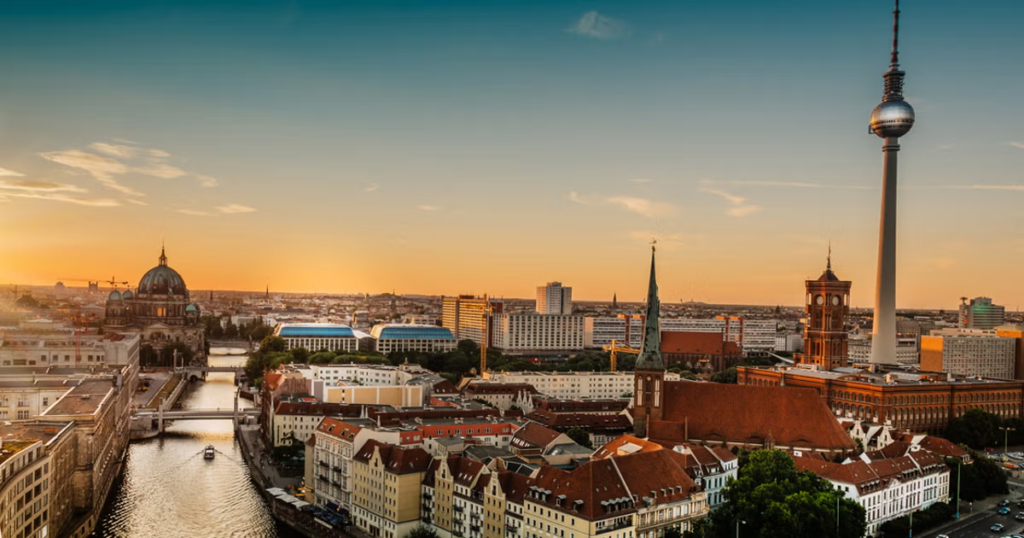
A reflection on Workshop 3 from our co-host and collaborator, Mustafa Gündoğan
The workshop exceeded all of our initial expectations in terms of talk qualities, attendee engagement and panel discussions. The talks delivered during the workshop were exceptional, providing valuable insights on prospects and challenges for developing a global quantum internet. The panel discussions, in particular, added another dimension to the event, bringing together experts from academia and industry for in-depth conversations that further enriched the discussion. Overall, I see it as a success, especially with the vibrant discussions and the engagement of attendees making it a memorable event.
Mustafa Gündoğan, Humboldt-Universität zu Berlin
A reflection on Workshop 3 from Daniel Oi
- We’re still in the early days of deploying a large-scale, global reach, entanglement distribution network, either on the ground or from space. There are many challenges (scientific/engineering/commercial/societal…) to this, but the workshop showed encouraging progress towards overcoming many of these.
- It is clear that Quantum Memories/Repeaters will be critical elements in the long term to enable long-distance channels and increase the entanglement distribution rate and overcome the direct transmission limit.
- There are a diverse set of physical platforms for quantum memories/repeaters ranging from warm vapours, cold atoms, BECs, rare-Earth ion-doped (REID) crystals, vacancy centres, and other solid state systems. Each has their own characteristics (pros/cons). The maturity of these approaches varies greatly. Cross-fertilisation of ideas/methods/techniques between the systems could help accelerate the development of the field.
- There have been pioneering demonstrations of secure satellite communication, teleportation, entanglement demonstrations, record coherence times. The first stages of space-based quantum communication networks is in the process of being established. We should take note of the lessons learned during these initial efforts to inform longer terms research.
- There are different scales (time, distance, rates, mode number,…) that quantum memories can operate applications with. Early demonstrations of quantum memory enhances communications could look to show advantage over direct transmission. What can we do with limited storage times, bandwidths, mode numbers?
- There many aspects also to be considered such as establishing low loss and high fidelity links, deploying constellations, networking architectures, protocols, other networking elements, enabling tech etc.
We will be producing a white paper as part of the INSQT outputs. This will be a Roadmap for the Space Quantum Internet and will include the following:
- Architectures
- Foundational technologies
- Enabling technologies
- Quantum memories and repeaters
- Scales, links
- Applications
- Roadmap, developmental paths
- Potential demonstrations, “NISQC” era intermediate goals
- Etc.
We are looking for volunteers to contribute to each of these sections, email us at physics-INSQT@strath.ac.uk to register your interest.
We are looking forward to our next INSQT Workshop hosted at the Physical Research Laboratory in March 2024, on Space Quantum Technologies for Science and Fundamental Physics.
Daniel Oi, University of Strathclyde
Workshop 3 Aims
INSQT’s workshop 3 focused on the space quantum internet. Distributing entanglement across a quantum network is a precursor to enabling distributed technologies that can improve performances in quantum sensing, imaging, and computing. This workshop reviewed efforts in developing global quantum networks that are capable of supporting these distributed challenges. The workshop focused on the role of key components and enablers of quantum networking within this architectural framework, such as quantum memories. The workshop featured a diverse range of talks from international partners actively involved in the development of various components necessary for achieving this ambitious goal across academia and industry. This includes the development of satellite links, memory-assisted quantum communication protocols, satellite and terrestrial networks, and the potential application of a space quantum internet to address open fundamental questions in Physics. The discussions on the progress, current readiness, and outstanding challenges were aimed at helping accelerate the development of quantum networks and shaping future activities.
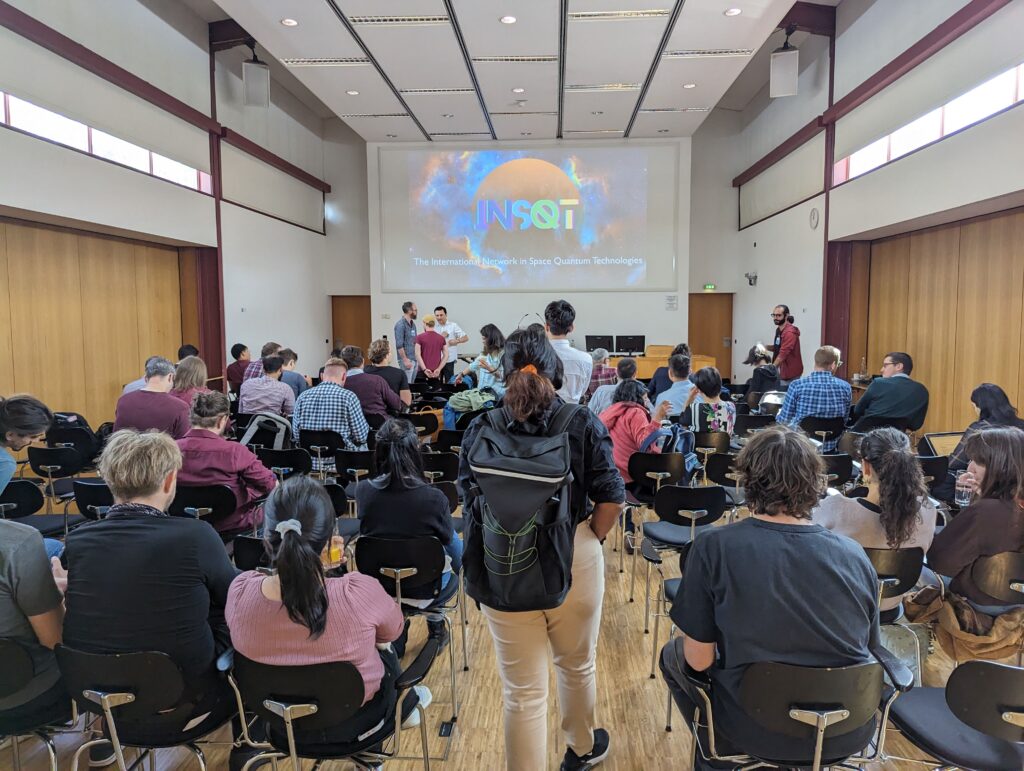
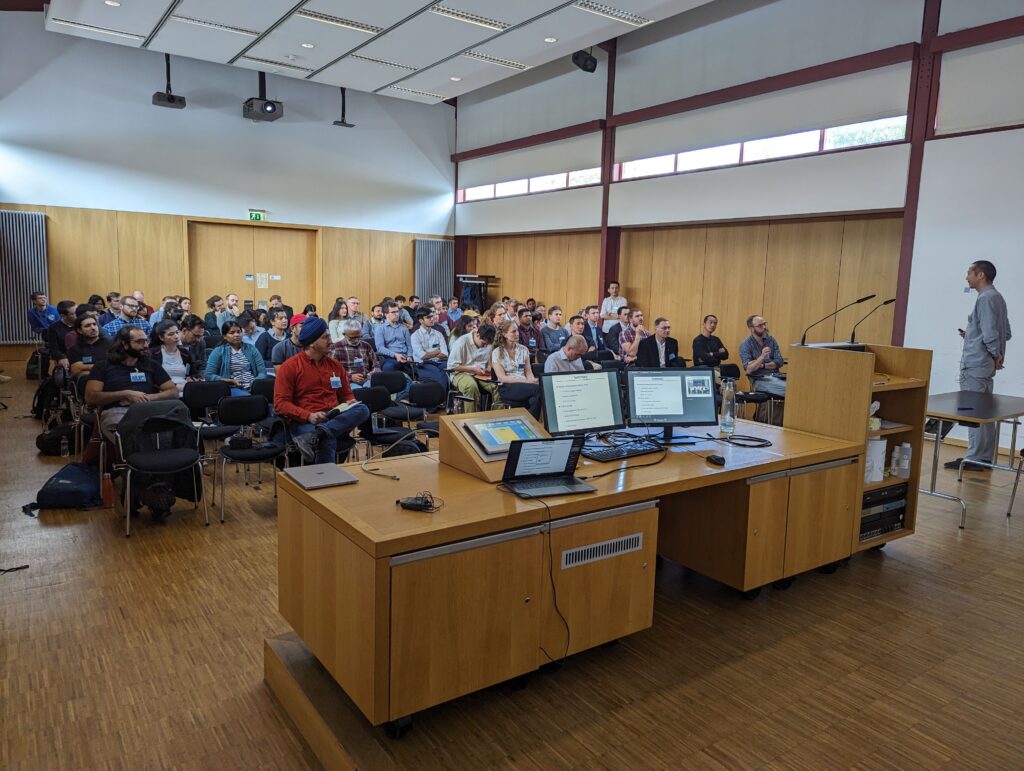
See the full gallery here!
Workshop Schedule (download here)
Day 1: 30 August 2023

Day 2: 31 August 2023
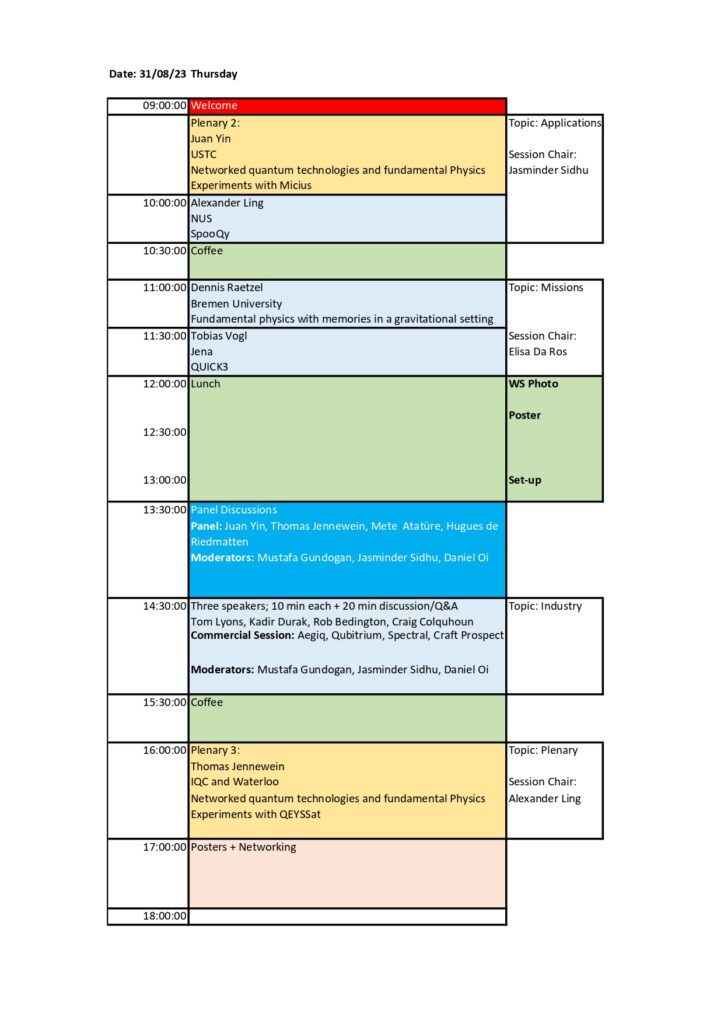
Day 3: 01 September 2023
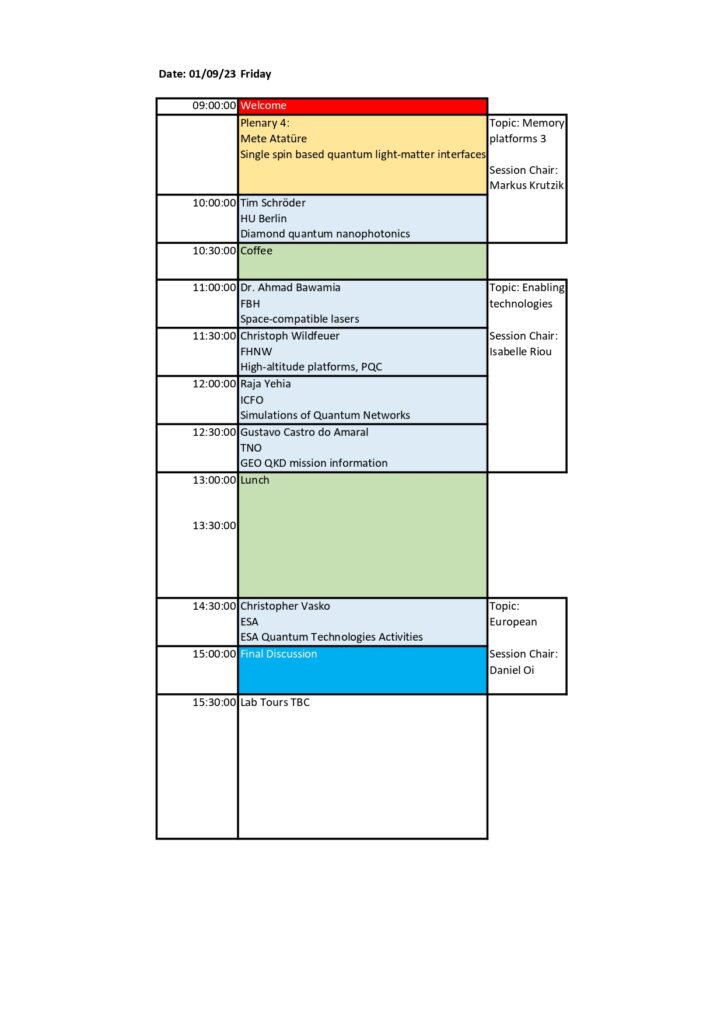
Workshop dates: 30th August to 1st September 2023
Venue: Erwinschrödinger Zentrum in Berlin, Germany. Accommodation included.
Organising Committee:
Mustafa Gündoğan (Humboldt Universität)
Jasminder Sidhu (University of Strathclyde)
Markus Krutzik (Humboldt Universität)
Contributions (talk and poster) covered the following topics:
- Concepts and Architectures for the Space Quantum Internet (SQI)
- Enabling technologies (Quantum memories, repeater architectures, timing synchronisation)
- Applications I: secure communication
- Applications II: detectors
- Applications III: networking quantum computers, distributed sensing
- Tests of Fundamental Physics
Workshop Aims:
- Concepts and Architectures for the Space Quantum Internet (SQI) for the large scale distribution of entanglement and enabler of quantum networking
- Quantum Memories in space or on-ground for space connections, performance and perspectives for future development
- Applications of the SQI, e.g. fundamental physics, secure communication, networking quantum computers, distributed sensing, PNT,…
Call for submissions to Research Directions: Quantum Technologies
We invited contributions to the CUP journal Research Directions: Quantum Technologies, in particular those addressing the question on the Ultimate Limits of Photonic Quantum Memories.
Invited Speakers:
- Hugues de Riedmatten, ICFO (Plenary)
- Mete Atatüre, University of Cambridge (Plenary)
- Juan Yin, USTC (Plenary)
- Thomas Jennewein, University of Waterloo (Plenary)
- Elisa Da Ros/Martin Jutisz, HU Berlin
- Eleni Diamanti, CNRS
- Dennis Raetzel, Bremen University
- Zeki Seskir, Karlsruhe Institute of Technology
- Kadir Durak, Özyeğin University
- Zong-Quan Zhou, USTC
- Janik Wolters, TU Berlin/DLR
- Sarah Thomas Imperial College London
- Andreas Wicht, FBH Berlin
- Tim Schroder, HU Berlin
- Faezeh Kimiaee Asadi, University of Calgary
- Christoph Wildfeuer, FHNW
- Magdalena Zych, University of Queensland (TBC)
- Erhan Sağlamyürek, Berkeley Livermore National Lab (TBC)
